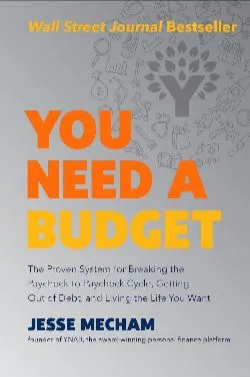
I picked up this book without realizing that it’s an outline of You Need a Budget’s philosophy to personal finance, and it’s actually a really great book.
I first used You Need a Budget a few years ago, when I was in graduate school and trying to figure out how to live in Boston on a stipend of $21,000 per year (which I didn’t wind up doing–I accumulated credit card debt in the process). At that point, You Need a Budget didn’t work for me, but now that I read the book, I suspect that it’s because I didn’t understand the theory behind author Jesse Mecham’s financial model.
When we think about budgeting, we tend to try to think about what our future expenses will be. Then, we create categories, allocate limitations, and try to stick with it.
This way of thinking about budgeting isn’t what Mecham means at all. He calls this “forecasting,” and it isn’t particularly helpful. For YNAB to work, you must already have the money available. The single major idea is: Every dollar has a job.
After you are paid, you take a look at your bank account and bills (as well as other expenses), and allocate each dollar to one of the categories. Now, you have a better sense of what you can pay for.
The really important thing here is not thinking about money as a series of expenses, but as value judgments and priorities. When you allocate money to specific categories, you are making a choice to determine what is most important to you. Would you rather spend a thousand dollars on bagels for the month, or would you rather put that money towards a mortgage? Do you pay off debt aggressively, or would you rather take a luxurious vacation to Bali? YNAB’s model forces you to think clearly about what you want in life, and I find that really valuable in trying to put myself in a better financial situation.
In the book, Mecham outlines four rules, all of which are variations on rule 1:
- Give every dollar a job
- Embrace your true expenses
- Roll with the punches
- Age your money
I’ve already explained the first rule a bit above, but the other rules are important for making sure that finances don’t fall apart.
For example, Mecham defines “true expenses” as things that you have to pay for, but they’re irregular and/or unexpected. Say your car breaks down, for example. Do you have the money to pay for it, or do you put it on credit? Embracing true expenses means first recognizing that things happen and, second, allocating a part of the budget to stashing away money in expectation of it. It’s better to allocate $50 per month so you have $250 available than to have nothing at all.
The third rule requires that understanding that budget categories are not set in stone. If you have hire expenses in one category than another, it’s ok to move funds from other categories to pay for it. It’s also good to have extra “fun money” without a category to ensure the budget isn’t too stringent.
Finally, “age your money” is an interesting way of thinking about your finances. The money you’re spending today–how long ago did it enter your bank account? Was it one day ago, one week ago, a month ago? By lowering expenses, you can break out of the paycheck-to-paycheck cycle and create some breathing room for yourself. The money I spend tends to be less than two weeks old: it’s the paycheck-to-paycheck cycle. It’d be really nice to see that my funds are actually 90 days old.
Mecham’s book has a chapter per rule, as well as a few thematic chapters like “budgeting as a couple,” “slaying debt,” “teaching your kids to budget,” and “what to do when you feel like quitting.” These chapters were neither as interesting nor as helpful as the four “rule” chapters (with an exception for the chapter on children), but they do flesh out the book somewhat.
Now that I’ve read this, I feel like I can run with a philosophy of personal finance that is actually helpful. It’s a way of limiting impulse spending and finding financial stability, and Mecham’s model for doing so actually seems really powerful. I’ve already created my own spreadsheet and began implementing some of the ideas here. I wonder how my finances will look in a few months!